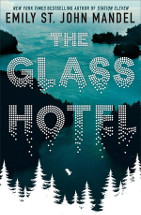The glass hotel by Emily St. John Mandel

Macmillan, 2020. ISBN: 9781509882816. 256pp.
(Age: Adult - Senior secondary) Recommended. This is a deeply complex
story, its narrative structure demanding our attention and echoing
that complexity. Emily Mantel's narrative is interwoven in time and
place, as she delves into the dark world of the pursuit of wealth at
any cost, moving always between the past, the present, and indeed
briefly into the future. While this is a challenge for the reader,
the story is absolutely riveting, as we are given frequent little
clues as to the darker deeds that are at the heart of this
narrative, and are made progressively aware of the immorality of
what is happening.
In a sense, this clever narrative controls what we know and only
reveals small details of the lives of the characters, their
activities, and their lives' trajectories. So we have to work to
build our own sense of what we know about their world and their
interactions, motivations, daily lives and their fate. It sparkles
and it is gloomy, it puzzles and it reveals, and we are led through
an extraordinary tale of venomous acts, of cheating those who place
their trust in people, and of a deep and complex mystery.
Ultimately, we are driven to ask what might be the meaning of the
title, that glass hotel that can be seen from the outside but what
is seen is only part of the story and really the actions that take
place are not seen. So that glass is both transparent and opaque,
allowing some information to be seen and understood and the deeper
mystery and evil is unseen, yet is in plain sight if the characters
were able to perceive that what they see is evil.
Taking place in various areas, such as a ship, the city of
Manhattan, or the wilds of British Columbia, Mandel's narrative
leads us deeply into the setting in which the narratives take place,
and we also become aware of some of the odd aspects of the
characters' lives. In exposing the notions of illegality and
immorality in the pursuit of wealth, Mandel presents these choices
as being acceptable to those for whom others' lives are immaterial,
where one's corrupt actions may lead to knowingly ruining people's
lives. This is a gripping aspect of the novel, as Mantel pushes the
reader to seek answers as to the rationale for the choices made by
the characters, and their capacity to live with ruining the lives of
others through the ongoing massive levels of deceit.
Mandel presents this very intriguing narrative as a reflection on
the breakdown of the usual expectations of a good life, or indeed of
a life seen to be well-lived, rather showing us how, and sometimes
why, the expectations that we have can be drastically skewed. In
demonstrating how one character's life can be dramatically changed
by a single action, choice or event, Mandel forces us to consider,
and thus to grasp, how this could impact dramatically on a person's
life. Perhaps the structure, cleverly giving us wonderful depth and
a developing understanding of the events, shows us the way in which
the puzzling nature of life elicits responses that we may never have
expected.
This riveting novel would be suitable for older adolescents and
adults.
Elizabeth Bondar